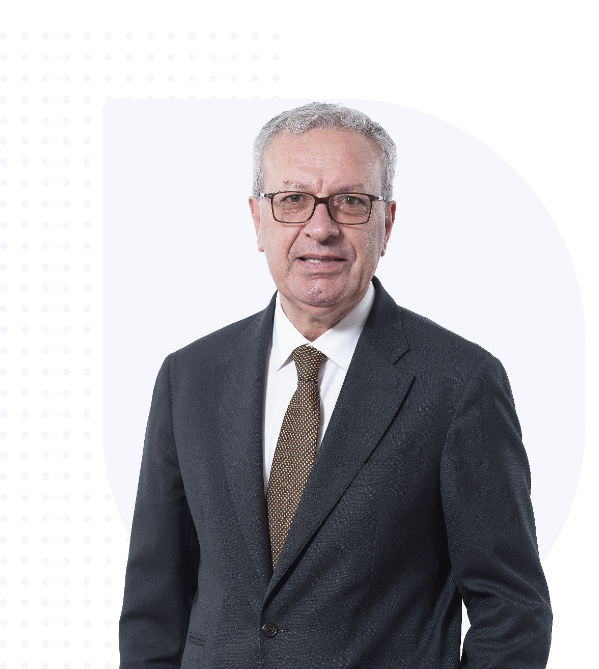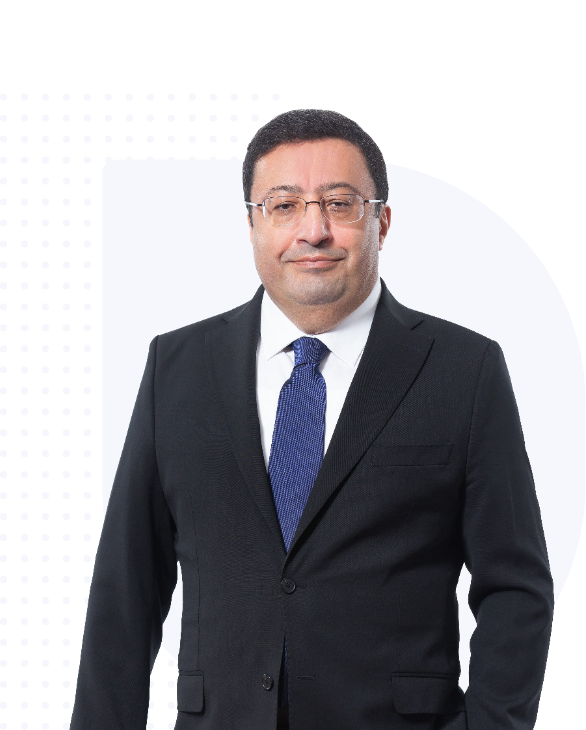2022
SUSTAINABLE BANKING TRANSFORMING THE FUTURE
INTEGRATED ANNUAL REPORT

TOWARDS THE TARGETED FUTURE...

As the bank publishing the first responsible communication policy of Türkiye, we continue to expand our positive impact with our efficiency and sustainability goals in every field we operate, while celebrating the 100th anniversary of our Republic. And we continue to create value with a focus on sustainable and inclusive development of Türkiye.
With our sustainable banking model, we contribute in climate- and environment friendly investments and inclusive economic growth, and we strive to differentiate with our approach in every area we touch.
We launched Transforming Steps, Türkiye’s first energy-efficient sustainability communication campaign. The campaign focuses on energy efficiency in all its processes, from the color palette to the system fonts. We are proud of presenting Türkiye’s first energy-efficient integrated annual report as a part of this project.

AN IMPORTANT STEP IN THE FIGHT AGAINST CLIMATE CHANGE AND THE TRANSITION INTO A CARBON - FREE ECONOMY

With our membership in the Net-Zero Banking Alliance, we have committed to supporting the transition to a zero carbon economy in the international arena.
We have been continuing the calculation and verification process of Scope 3 emissions, which we started with carbon-intensive sectors, since the end of 2021. We included financed emissions for companies operating in carbon-intensive sectors, which account for 8.4% of our portfolio as of the end of 2022.
We have completed our application to the Science Based Targets Initiative for our Scope 1-2-3 emissions; our verification process is ongoing.
Share of projects we are involved in the financing of, in Türkiye’s installed capacity of renewable energy.
In our use of green electric energy and direct emissions as a carbon-neutral bank.
Our emission reduction contributions via renewable energy projects we are involved in financing.

STRONG STAKEHOLDER ENGAGEMENT

We are in constant communication and reciprocal engagement with our stakeholders. Thus, taking the concept of Double Materiality into account, we have updated our stakeholder analysis and reviewed our strategic focuses in 2022.
We are the first bank in Türkiye to announce its compliance with the World Economic Forum Stakeholder Capitalism Metrics.
Within the scope of well-established stakeholder relations, we have signed a funding agreement of approximately USD 650 million.
The environmental, social, and governance (ESG) linked funding ratio
Long-lasting relationships with Development Finance Institutions.

INTERNATIONALLY RECOGNISED SUSTAINABLE BANKING PRACTICES

Our ESG risk rating reached 7.9 points, which represents the lowest risk level. Among the banks evaluated, with this rating, we ranked 1st in Türkiye, 12th among international development banks, and 15th in the global banking sector. With this score, we became the only institution from Türkiye that managed to enter the List of 50 Institutions Achieving Top ESG Performance of the World determined by Sustainalytics.
We have raised our CDP Climate Change Programme score to the leadership level. Thus, while ranking among the first 21% in the world, we have been among the top Turkish banks.
We have undersigned significant achievements that touch every part of the capital of our value creation model and are accepted on international platforms.
Our Refinitiv ESG Rating
Our SAHA Corporate Governance Rating

SUSTAINABLE GROWTH FOR THE FUTURE CENTURIES OF OUR REPUBLIC

We bolstered our strong liquidity with total funding worth of approximately USD 750 million that we provided in 2022.
We have positioned ourselves among the banks with the highest coverage ratios in the sector, not only by maintaining our intact asset quality but also by strengthening our provisions.
We have strengthened our capital further thanks to our internal capital generation capacity.
We maintain our sustainable strong profitability as a result of our successful activities in 3 main business lines.
Total assets
Capital adequacy ratio
Return on equity ratio


Message from the Chairperson
Adnan BALİ / Chairperson of the Board of Directors
WE HOPE THAT THE GOOD PRACTICES TSKB HAS PUT FORWARD IN THE AREAS OF ENVIRONMENTAL, SOCIAL, AND GOVERNANCE WILL SHED LIGHT ON THE WAY FOR BOTH OUR INDUSTRY AND THE REAL SECTOR COMPANIES.
While commencing the year 2023, which marks the 100th anniversary of our Republic, with great excitement, we were deeply shaken by the earthquake disasters that unfortunately affected our 11 provinces. Our losses are immense, and it is impossible to bring those who lost their lives back, but it is possible to heal the wounds and build up those who were destroyed in a stronger way. We all believe that we will overcome this difficult period with great solidarity and cooperation by working hard.
While starting my assessments about our integrated annual report on TSKB’s 2022 results with these feelings, I wish God’s grace upon the citizens who lost their lives and rapid recovery to the injured citizens as well as well being and strength to whole country
In 2022, when we faced the economic decisions taken during the fight against the COVID-19 pandemic and the challenging and inflationary repercussions of this process for global supply chains, we also felt the effects of geopolitical developments intensely. The war between Russia and Ukraine and the sanctions imposed on Russia, as well as the rise in energy and food prices, have created inflationary pressure, while the increasing uncertainties combined with the ongoing epidemic measures and the increasing number of incidents in China have triggered recession concerns in the world.
In this context, we have observed that the economies of developed countries have entered a tightening process in their monetary policies. The US Central Bank (Fed) increased the monetary policy rate seven times, bringing it to 4.25–4.50% at the end of the year, while the European Central Bank (ECB) ended its negative interest rate policy that it had been maintaining for eight years. With the interest rate hikes, the ECB increased the deposit interest rate to 2% at the end of the year. In light of all these developments, the expectation that there will be a slowdown in economic activity in 2023 compared to last year prevails. For example, according to the forecasts of the International Monetary Fund (IMF), following 3.2% of estimated growth rate in 2022, growth rate is expected to decline to 2.7% in 2023.
However, we have witnessed that the Turkish economy exceeded expectations and achieved 6.2% growth in the first nine-month period. Having kept the monetary policy interest rate constant in the first seven months of the year, the Central Bank of the Republic of Türkiye (CBRT), making interest cuts for the rest of the year, decreased the weekly repo interest rate to 9% at the end of 2022. It continues its macroprudential policies, which have significant repercussions on the banking sector, within the scope of the Liraization strategy. Although the leading data in the last quarter indicate a slight slowdown due to the external demand effect, we anticipate that we will end the year with a growth of 5.2%.
In line with the policies implemented by the CBRT, the banking sector completed the year with a loan growth of 40.6% on an foreign currency (FX)-adjusted basis. The sector, which maintains its asset quality with its non performing loan ratio of 2.1% as of the end of the year, has further strengthened its FX liquidity buffers with the effect of the contraction in FX-denominated loans. In 2022, the capital adequacy ratio of the sector, which was supported by 41.6% of strong return on equity, was realized at the level of 19.5%, taking into account the temporary measures of the BRSA.
We anticipate that a period of uncertainty will continue not only in the areas covered by global macroeconomics and production processes but also in terms of diplomatic processes. In this period, when recession concerns are also surging, I am in the view that it is very critical for institutions to maintain their financial stability and that the decisions to be taken in this direction will shape the future. I believe that green and inclusive transformation has a guiding role that institutions need in this critical process. After the last disaster that we experienced, the establishment of sustainable living and production models that are resistant to natural disasters, as well as the healing of earthquake wounds, will continue to be one of our main agenda items for a long time.
Despite global uncertainties, important steps have been taken in our country and around the world in the field of combating climate change and sustainability in 2022.
One of these important steps taken last year was the EU Council’s announcement that the parties had reached a consensus on the Carbon Border Adjustment Mechanism (CBAM), which has been a topic of discussion between the member states and the negotiators of the European Parliament for many years. The gradual implementations that will follow this consensus, which is a big step for the EU’s goal of becoming a carbon-neutral continent in 2050, are also of close interest to Türkiye, which has intensive trade relations with EU. We think that the low carbon footprint of our country compared to other countries and the acceleration of renewable energy and sustainability practices every day will give Türkiye an advantage in competition. TSKB follows the developments very closely and continues to support the changes, transformations, and requirements in Türkiye, both with our sustainability-themed finance products and with our investment banking as well as our advisory services.
On the other hand, we are proud to see the important reflections of the good practices that we have implemented on international platforms. While our bank was awarded the best bank in the field of sustainable development of Türkiye at the Global Banking and Finance Awards 2022, it was named the “Most Sustainable Bank of Türkiye” for the second time in a row within the scope of the banking awards organized by World Finance magazine. Another global award organization where the efforts and visions of my colleagues were rewarded was “Türkiye’s Best Sustainability Practices in Banking” given by Global Economics magazine. Our reports, which are transparent and comply with international reporting standards, also took place among the examples of good practice in the international arena. Our 2021 Integrated Annual Report, which we published in 2022, won the “Honorary Award” at the ARC Awards of International Reporting Awards, while the score of our Carbon Disclosure Project (CDP) Response was moved to the “A” level, which represents the leadership level, by the CDP, and we were proud of being among the first 21% in the world and ranking among the top Turkish banks.
As you know, in the context of sustainability, one should have already accomplished and left behind the steps of determining a circular approach, and setting its stance on ESG impact issues. Today, if we want to make a meaningful difference for the future, we need to ensure our actions gain momentum as soon as possible to leave them in much better conditions than we have, going beyond guaranteeing the life rights of the generations after us. Unfortunately, the disasters we have experienced recently have underlined this necessity again.
The business world, which is the biggest front of the transformation, is one of the most important parties that are expected to take substantive steps. In this new period, when we need to accelerate our steps for a bright future, we hope that the good practices TSKB has put forward in the areas of ESG will shed light on the way for both our industry and the real sector institutions.
Nowadays, when almost every concept is redefined and there is a transformation and awareness in all areas of life, not only in technology, it is not sufficient to desire to adapt to the transformation but necessary to have the determination and motivation to realize this desire.
In addition to adapting to the transformation, we know that TSKB will use all the opportunities to the fullest extent in order for our country and our people to look at the future more strongly and confidently in the next hundred years of our Republic. We also invite our stakeholders to take more responsibility for this objective and establish effective cooperation to this end.
We wish that 2023 will be a hopeful year for our country, our stakeholders, and the TSKB family.
Sincerely,

Adnan BALİ
Chairperson of the Board of Directors

Message from the CEO
Murat BİLGİÇ / CEO and Member of the Board of Directors
WE CONTINUE TO CREATE ADDED VALUE FOR THE GREEN TRANSFORMATION OF THE REAL SECTOR WITH OUR SUSTAINABLE AND INCLUSIVE BANKING VISION.
We are deeply saddened because of the earthquakes. We wish God’s grace to our citizens who lost their lives, condolences and patience to their relatives, and fastest recovery to the injured.
Unfortunately, our country has faced highly severe earthquakes for centuries, and according to scientific data, it will inevitably continue to face them due to its location. Today, the first task of our authorities and organizations is to restructure our provinces affected by the earthquake in a stronger way, heal the wounds of our people, and ensure that they get back to their normal lives as soon as possible. As a development bank working with a sustainability mission, we think that we need systematic steps and effective cooperation for an infrastructure that is resistant to such large-scale and highly severe natural events, urbanization, disaster management, production, and economic order. Just as a successful realization of the green economic transformation is an important target that will successfully integrate us into the global world, establishing a life resistant to earthquakes and natural disasters, which is the reality of our country, should be one of our most important priorities. Although we have passed another big test on the 100th anniversary of our Republic, we also see this as an opportunity to raise our second hundred years on much more solid foundations. TSKB has mobilized all its resources to provide permanent solutions in this respect.
We wish fastest recovery to our whole country, especially the people of the region.
You have drawn crucial assessments by asserting permanent and sustainable solutions. Now, we would appreciate receiving your opinions specific to the year, which is the subject of the report. 2022 was expected to be a period of recovery after the global pandemic. However, the uncertainties surged by the Russia-Ukraine hot war and the subsequent economic recession have significantly affected corporate strategies as well. How would you define the year 2022 of TSKB?
While we were thinking that we would get out of the COVID-19 pandemic and return to our old normal, the Russia-Ukraine War that started in Europe, the embargoes imposed by the West on Russia, the strong rise in energy prices, and the monetary policies that tightened with the deepening inflation problem around the world changed all the balances in the world.
While growth is slowing down globally, we have seen inflationary pressures along with the risk of recession. We have experienced a year in which China’s role in the global economy has begun to change. The West considers this country as a serious competitor, and mounting economic protectionism weighed on the year.
In addition, all these developments—climate change, income, gender inequality, as well as political movements— which have marked the year 2022 will persist to be environmental and social issues we will take into account in the coming period.
TSKB is a bank that operates with the mission of sustainable development and inclusiveness. We closely follow all the dynamics on a global scale, and we are moving forward with the goal of making a qualified contribution to the development goals of our country irrespective of any backdrop. In 2022, we provided nearly USD 2 billion in support of the economy via cash and non-cash loans. Thanks to our knowledge and our expert technical staff, we have continued to implement successful projects in the investment banking and advisory business lines. In the coming period, we will continue to create value together with all our stakeholders in the development and transformation journey of our country in line with our mission and impact-oriented approach by analyzing risks and opportunities well in the face of difficult and uncertain conditions.
In the current stakeholder and materiality analysis, sustainable financial performance is among the issues with a very high strategic priority. In this context, how would you evaluate TSKB’s performance compared to last year? What are your forward looking expectations for 2023?
We have completed 2022 with a strong performance in line with our goals. While the total asset size of our bank reached TL 115.6 billion, our total loan portfolio, which indicates our direct contribution to the real economy, also reached TL 80.3 billion, constituting 69% of our total assets. While maintaining our asset quality, our shareholders’ equity surged by 84% to reach TL 12.8 billion and we have posted a net profit of TL 4 billion with 272% increase. We supported our capital adequacy ratios, which are well above the legal limits, with our solid profitability. Also, we positioned ourselves among the banks with the highest coverage ratios across the sector by lifting our provision ratios on the back of our cautious approach.
We aim to expand our loan portfolio by 5% on a fx adjusted basis in 2023. We will realize this growth mainly in the areas of climate finance as well as inclusion. We will continue to keep our asset quality strong and strengthen our capital in a way that will further support development.
While expanding our coverage and scope of influence with our knowledge banking approach, which we observe in our investment banking and advisory business lines, we aim to double our gross fee and commission revenues. Via our subsidiaries, which contribute to our revenues with their successful performances, we will continue to offer innovative solutions that will guide our customers within the framework of sustainability principles.
Your value creation model enables continuous capacity development and information sharing with international financial institutions and development finance institutions. In line with Türkiye’s needs, many themes are determined thanks to close cooperation. Could you share the sources of funding provided this year with us?
As usual, we have closely followed COP 27 and its reflections, where climate risks and actions were discussed. Türkiye, which ratified the Paris Agreement in the Turkish Grand National Assembly, announced the updated National Contribution Statement to the public at the same event. The importance that Türkiye attaches to green transformation in all sectors in all areas of the economy within the framework of its development priorities was also included in the Medium-Term Program announced in the same year. Thus, we have observed the transformation of issues such as climate finance and circular economy into important agenda items both in the world and in Türkiye.
While monitoring global development focuses, we also closely analyze the development needs of our country and work on new themes that are compatible with the strategies of development finance institutions. In line with our efforts, the previous year has been a very active and fruitful period for us. In 2022, we provided nearly USD 650 million in funding from five different development finance institutions. A major part of this funding was climate finance-themed. While inclusiveness takes its place in our mainstream themes, we have added the circular economy, which we think will become even more widespread in the medium and long term, into our financing themes.
We renewed the syndicated loan, which we have provided indexed to sustainability criteria in recent years, for the third time with even more differentiated criteria. The loan, which is subject to three different sustainability criteria compatible with our strategy, was realized in the amount of approximately USD 110 million with the participation of eight banks from eight different countries from Europe, America, Asia, and the Middle East.
In addition to the theme of gender equality, we will finance renewable energy and energy efficiency investments aimed at reducing greenhouse gas emissions throughout Türkiye, advanced technology-supported projects in this field, technologies and services supporting the green economy, climate change mitigation and adaptation investments, and circular economy investments and the companies aiming to develop circular economy practices with these funding agreements, through which we have further strengthened our strong liquidity, in the next period.
TSKB is further improving its ESG rating, which is shown as an important reference for investors who include ESG criteria in their investment decisions, every year. You completed the 2022 update in November with sustainable practices that extend to all components of the business model. What is your ranking in the international arena with your current rating?
We continued to improve our Sustainalytics’ ESG risk rating in 2022 as well. As a result of a meticulous study, while we stood out among banks on a global scale with a risk rating of 13.6 in 2021, we improved our rating further by nearly 6 points in 2022 to reach the lowest risk level with 7.9. By decoupling positively from the other institutions on the list of dimensions such as ESG-oriented strategy, environmental and social risk management, human capital, and business ethics, we ranked first in Türkiye with our risk rating, 12th among international development banks, and 15th in the global banking sector. This has really been a source of great pride for all of us. We will continue to maintain this leading position with good practices.
The concept of double materiality defines each sector representative as a corporate citizen responsible for our planet. In addition, it emphasizes that institutions should include environmental and social issues as well as financial ones in decision-making mechanisms and materiality analyses. As TSKB, you are operating in this direction in accordance with changing conditions and needs with your dynamic business model. In this context, can you tell us about the important developments in 2022?
TSKB continues to support the economic, environmental, and social development of our country with our sustainable and inclusive banking vision and creates added value for the green transformation of the real sector. In addition to financing sustainability-themed investments, we use our knowledge, experience, and vision to offer innovative and alternative solutions to our customers with our investment banking and advisory services. In this context, fighting climate change and climate adaptation are among our most important strategic focus areas.
In the previous year, we have achieved many important developments that demonstrate our commitment to sustainability. We have continued our studies on measuring and reporting the emissions of our loans in carbon-intensive sectors, which we have included in our audited emission calculations in 2021. As of the end of 2022, emissions included in Scope 3 calculation constituted 8.4% of our total portfolio. During the same period, we applied to the Science-Based Targets Initiative for our emission targets. While the relevant approval process is ongoing, we have become a signatory of the Net-Zero Banking Alliance launched by the United Nations Environment Programme Finance Initiative (UNEP-FI). With this signature, we have committed to aligning the loan and investment portfolio with the zero-emission targets by 2050. In the next period, we will transparently share our road map and goals that we will determine within the scope of our commitment and our performance in this regard with our stakeholders.
Our sustainability vision not only supports the transformation of our country and the business world. We also aim to take part in this transformation as an institution. Double materiality emerges at this point. Each of our colleagues also keeps the ESG approach on the agenda in a way that is integrated with their daily responsibilities. We have been offsetting our emissions arising from our bank operations since 2008, and we use green energy on all our campuses. SDGs are at the center of all our activities. The ratio of our SDG-related loans in the total portfolio is 91%, whereas the share of our loans contributing to climate and environment-related SDGs is hovering around 60%.
While increasing its importance every day, sustainability brings along the problem of “Green Washing” as well. We see that many advisory decisions and regulations have started to be introduced against this problem in Europe and in our country. By taking an exemplary step in this field, you have become the first institution in Türkiye to publish the Responsible Sustainability Communication Policy. What do you aim for with this policy?
We pay attention to the communication of the pioneering practices we have implemented with our stakeholders within the scope of our sustainable and inclusive banking mission for the dissemination of good examples.
TSKB has been carrying out all its communication activities with an integrated perspective for many years, taking into account the ten principles of the UN Global Compact and the UNEP-FI Principles of Responsible Banking with the aim of making the economic, environmental, and sociocultural development of our country qualified and continuous. We are reporting to our stakeholders with the principles of transparency and accountability in international standards, and we are conducting detailed audits of our main performance indicators related to our targets. We support impact oriented spokesmanship, advocacy, and cooperation opportunities in the direction of a sustainable future, and we also take care of our environmental and social footprint in our communication activities. We have also prepared our Responsible Sustainability Communication Policy to be a guide for all sectors, and we hope to inspire all professionals as well as green-collar employees with this study.
2023 is the 100th Anniversary of the Republic of Türkiye. As the leader of an institution working for the sustainable future of our country, what is your message for this special year?
As a 73-year-old institution working with a sustainable and inclusive development mission, I find it important to evaluate 2023 from the perspective of steps that will carry our country into the future. While planning the second century of our Republic, I believe that all institutions should take responsibility for our common future, both in a national and global context. Unfortunately, the recent earthquakes have left their mark on this year. The most urgent and material issue that we need to bring to a solution will be the re-establishment of our destroyed cities and the integration of our people into life in a healthy way.
On the other hand, with the climate crisis risks starting to become a reality, we have entered an era where we need to make radical changes in our current production and consumption habits. This means qualified impact oriented investments with a transforming perspective. For our country to become a successful actor in the global economy, we have to achieve net zero carbon targets and development with high social inclusiveness together. In this context, sustainability, green transformation, efficiency, and equality opportunities will continue to be our main agenda items. The development of technology, innovation, and digitalization in a way that directly creates added value to these goals is of critical importance. We believe that our country will write a qualified growth story with its economic, environmental, and social axes by rapidly healing the wounds of the earthquake disaster we have been through, and we are channeling all our strength into concrete investments and solutions that contribute to these goals.
In the 100th anniversary of our Republic, as the large TSKB family, which includes our subsidiary companies, we are aware of our responsibility with our competent human resources, and we are ready to work harder and create value in the new hundred years of our Republic.

Murat BİLGİÇ
CEO and Member of the Board of Directors
Strategic Plan
Direct Impact
Direct impact refers to SDGs to which the relevant material issue makes a direct contribution. This material issue touches on the majority of the sub-targets of the relevant SDGs and contributes to these SDGs in their entirety.
Indirect Impact
Indirect impact refers to SDGs where the relevant material issue touches at least one of its sub-targets.

Taking into account the sustainability vision of our Bank and the practices it has implemented in this direction, the SDGs that are considered as a material focus area for the Bank in the future
SDG 4: Quality Education

SDG 5: Gender Equality

SDG 8: Decent Work and Economic Growth

SDG 9: Industry, Innovation and Infrastructure

SDG 10: Reducing Inequalities

SDG 12: Responsible Production and Consumption

SDG 13: Climate Action

SDG 16: Peace, Justice and Strong Institutions












